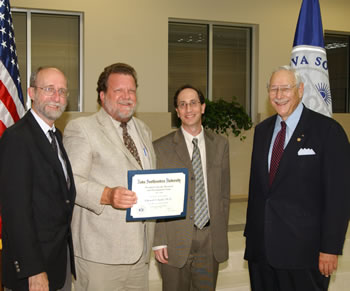VHF Tracking of Captive-Release Manatees in the Alvarado Lagoon System, Veracruz, Mexico
Grant Winners
- Edward Keith, Ph.D. – Oceanographic Center / Farquhar
- Enrique Portilla-Ochoa – Institute for Biological Investigations, University of Veracruz
Deans
- Don Rosenblum – Farquhar College of Arts and Sciences
- Richard Dodge – Oceanographic Center
Abstract

This is a collaborative research project designed to investigate the habitat use and behavioral ecology of the Antillean manatee (Trichechus manatus manatus) in the Alvarado Lagoon System (ALS) in the state of Veracruz, Mexico. For the past six years I have been collaborating with a group of investigators in Mexico, and during this time our efforts have focused on educational and conservation programs to reduced poaching, the primary cause of manatee mortality in this region. Additionally, a total of six orphan manatee calves have been found and taken to the Veracruz Aquarium for rehabilitation and eventual release back into the ALS. As the number of manatees at the Aquarium has increased, they have had to enlarge their facilities, and they now have more manatees than they can realistically maintain. Thus, they desire to release several of these manatees in the coming year into the ALS, after a period of acclimatization at a captive facility under construction in the ALS. We propose to attach VHF radio transmitters to the released manatees in order to determine their movements, monitor their health status in the period immediately after release, and recapture the manatees if necessary to assure their survival. Movement data will be incorporated into a geographical information system (GIS), that will constitute the basis for the analysis of home ranges, seasonal migrations, etc. Because there are almost no data on the behavior, movements, and feeding of manatees in the ALS, this study will provide valuable information required for the formulation of management plans, educational activities, and population recovery projects. Hopefully the attachment of the VHF transmitters will discourage the local populace from chasing, harassing, or killing the released animals. These results will also contribute to a growing body of knowledge about the habitat use and behavioral ecology of the Antillean manatee.